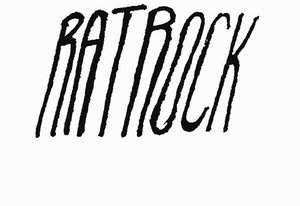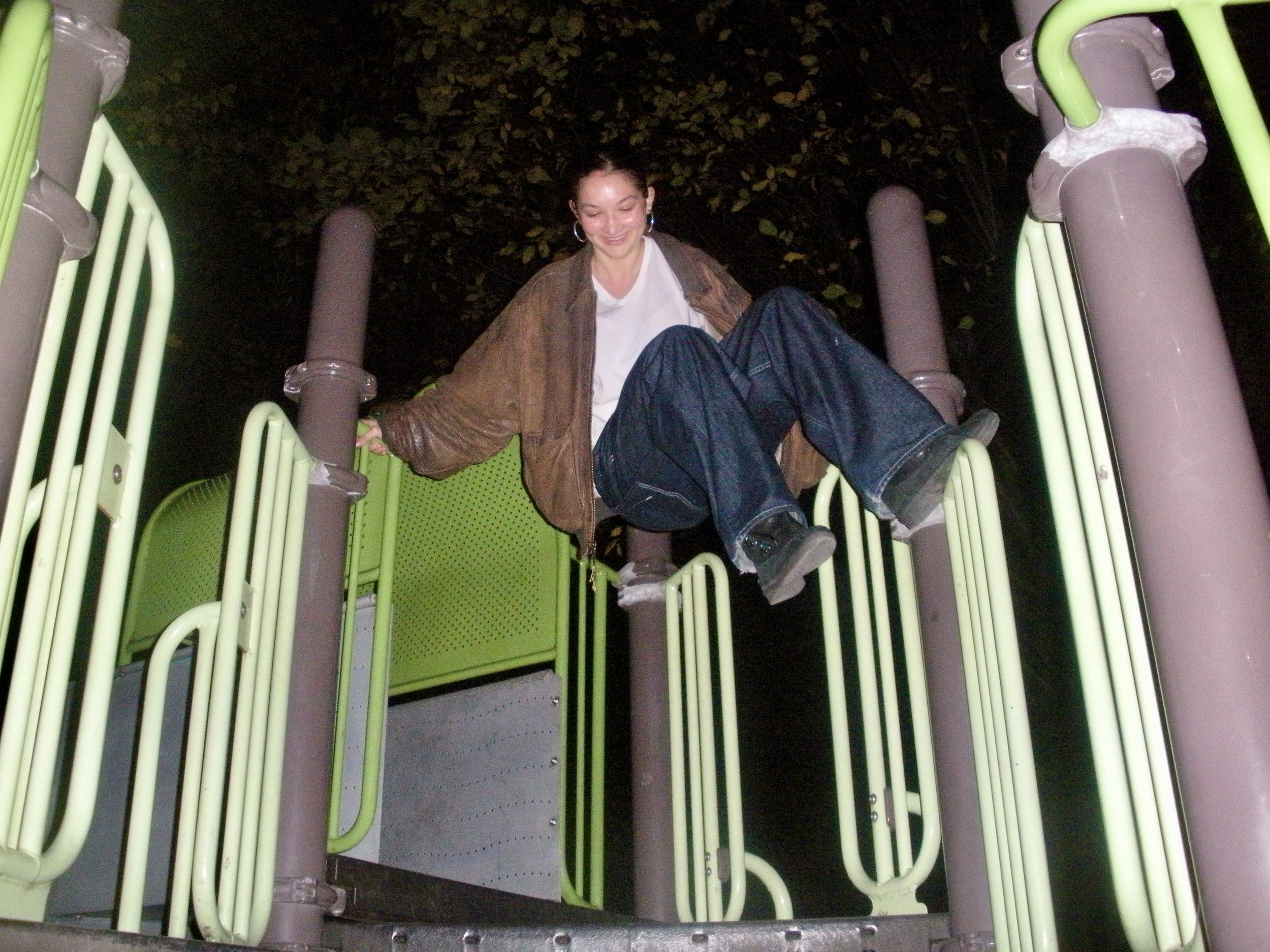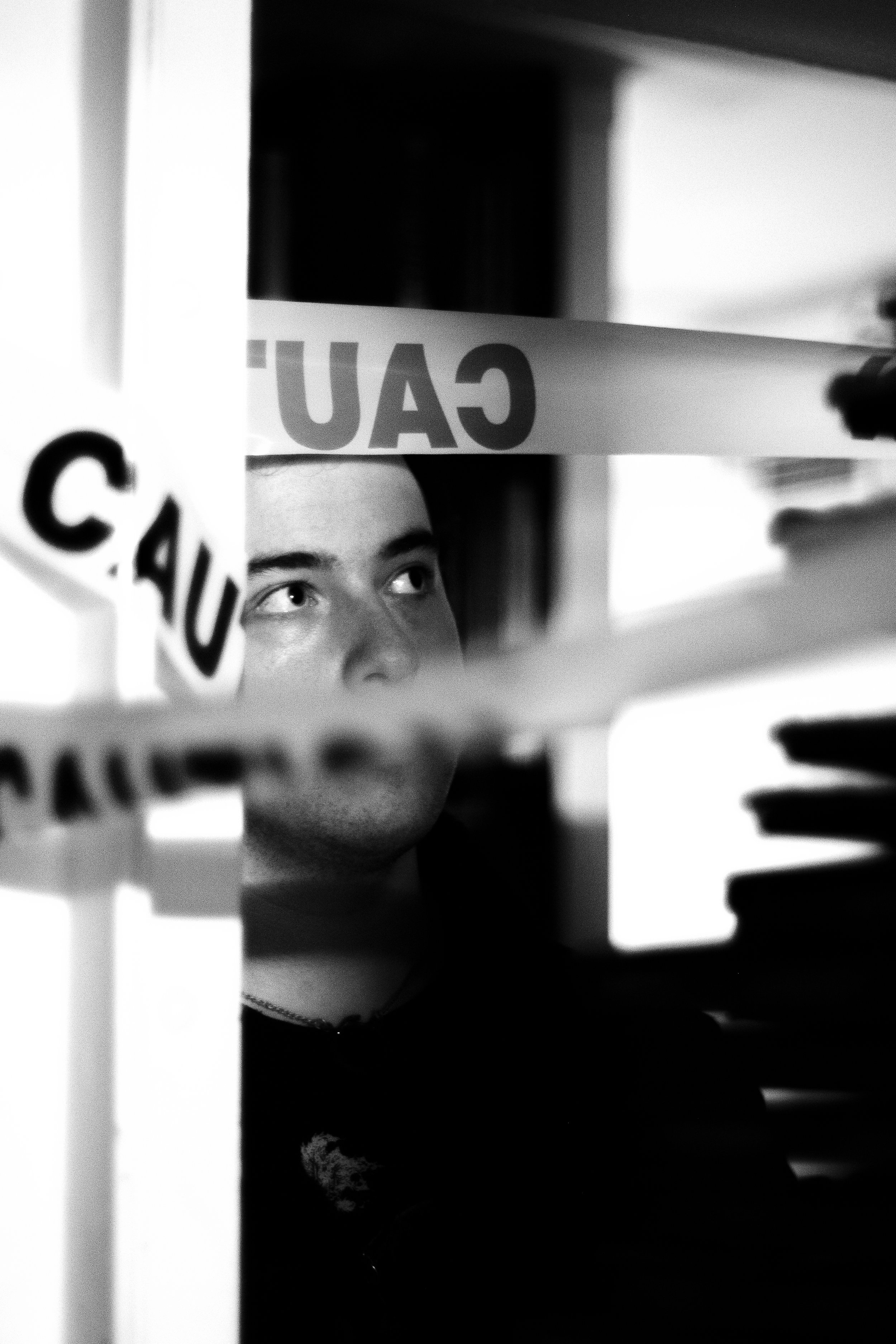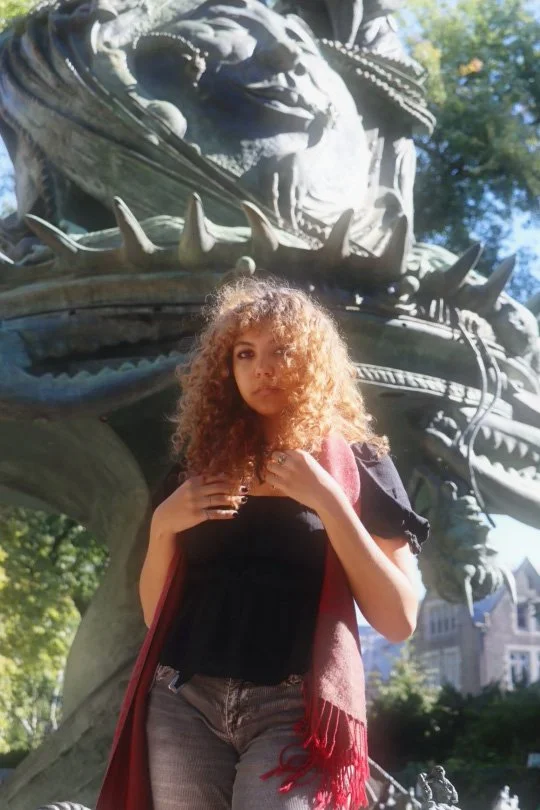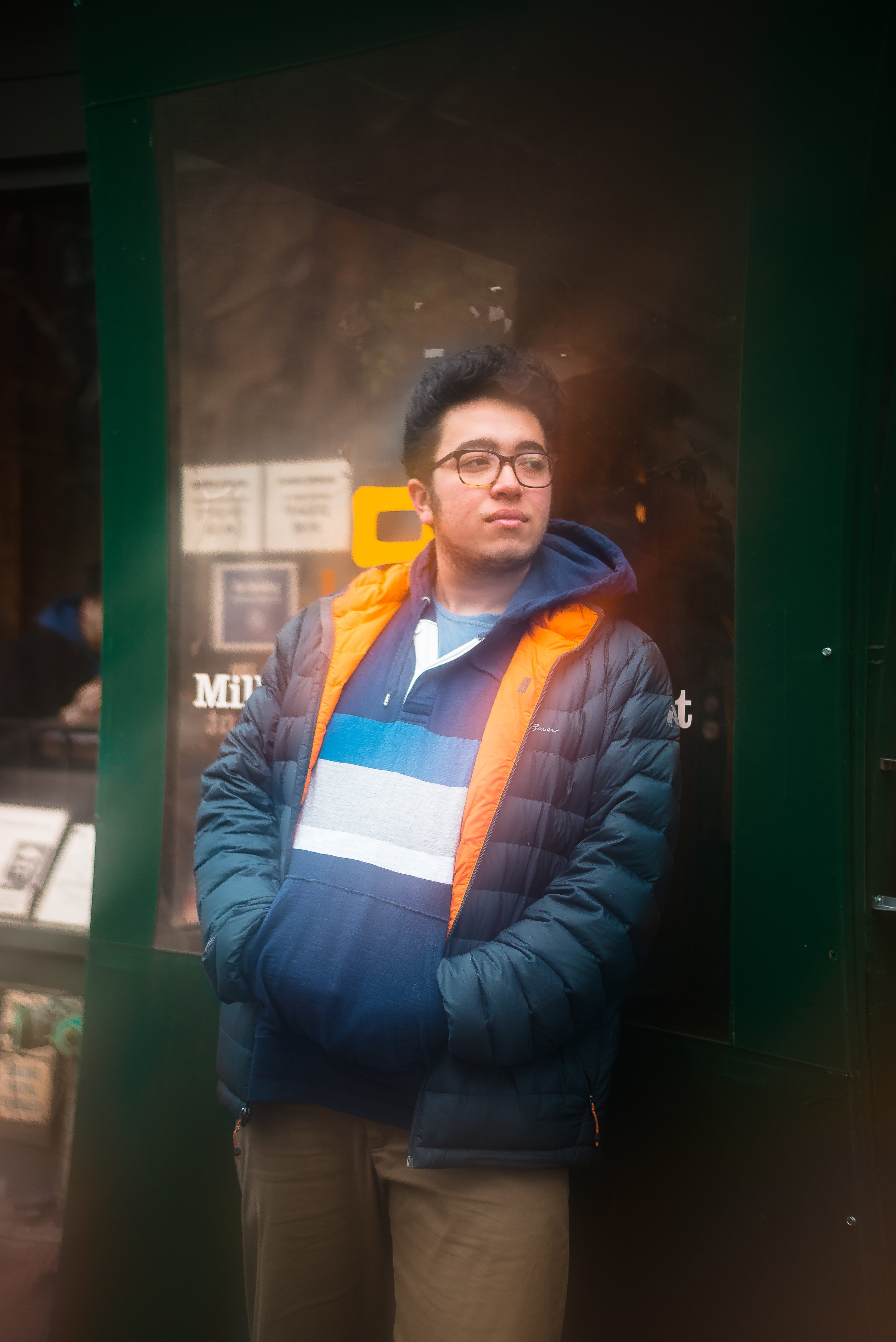
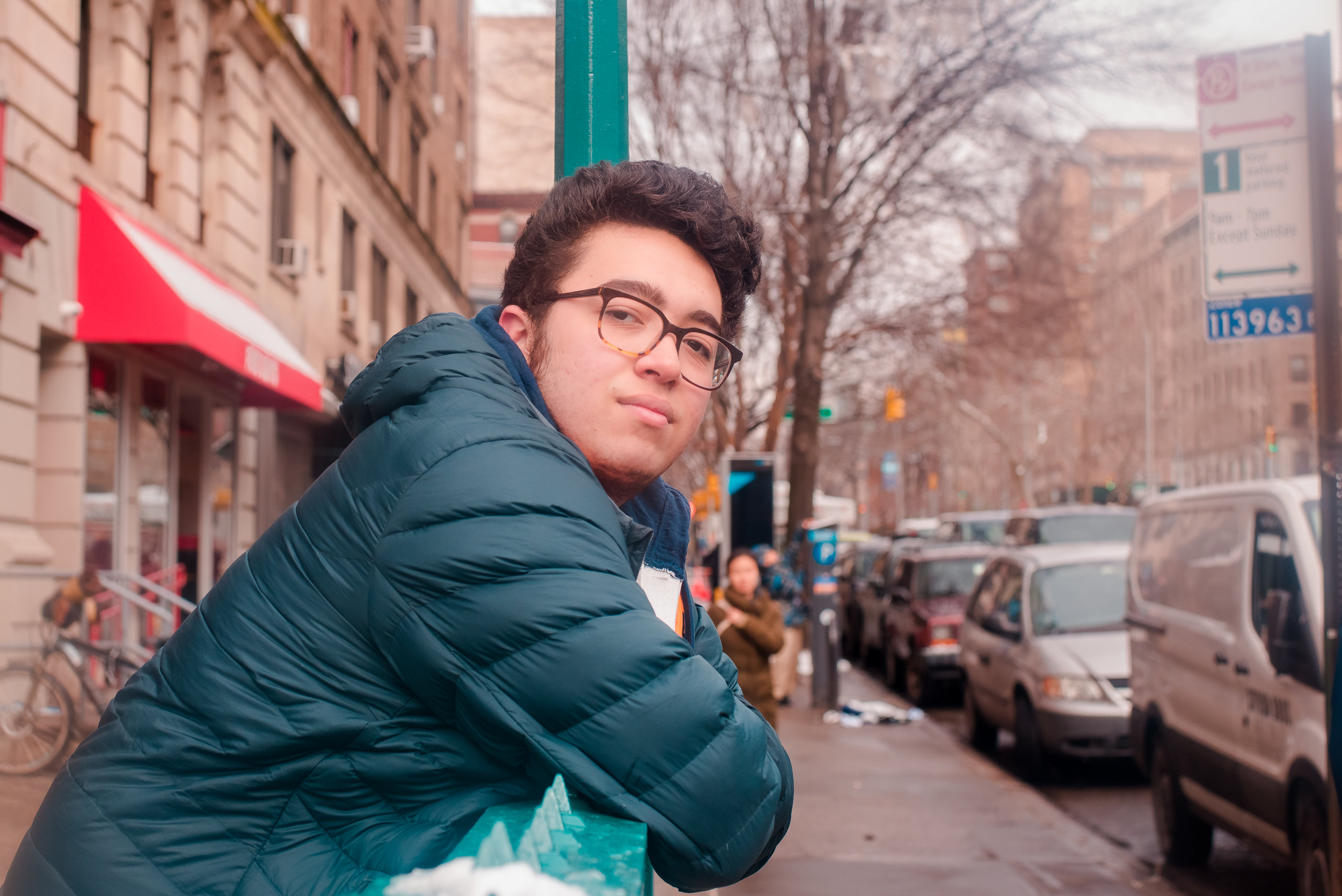
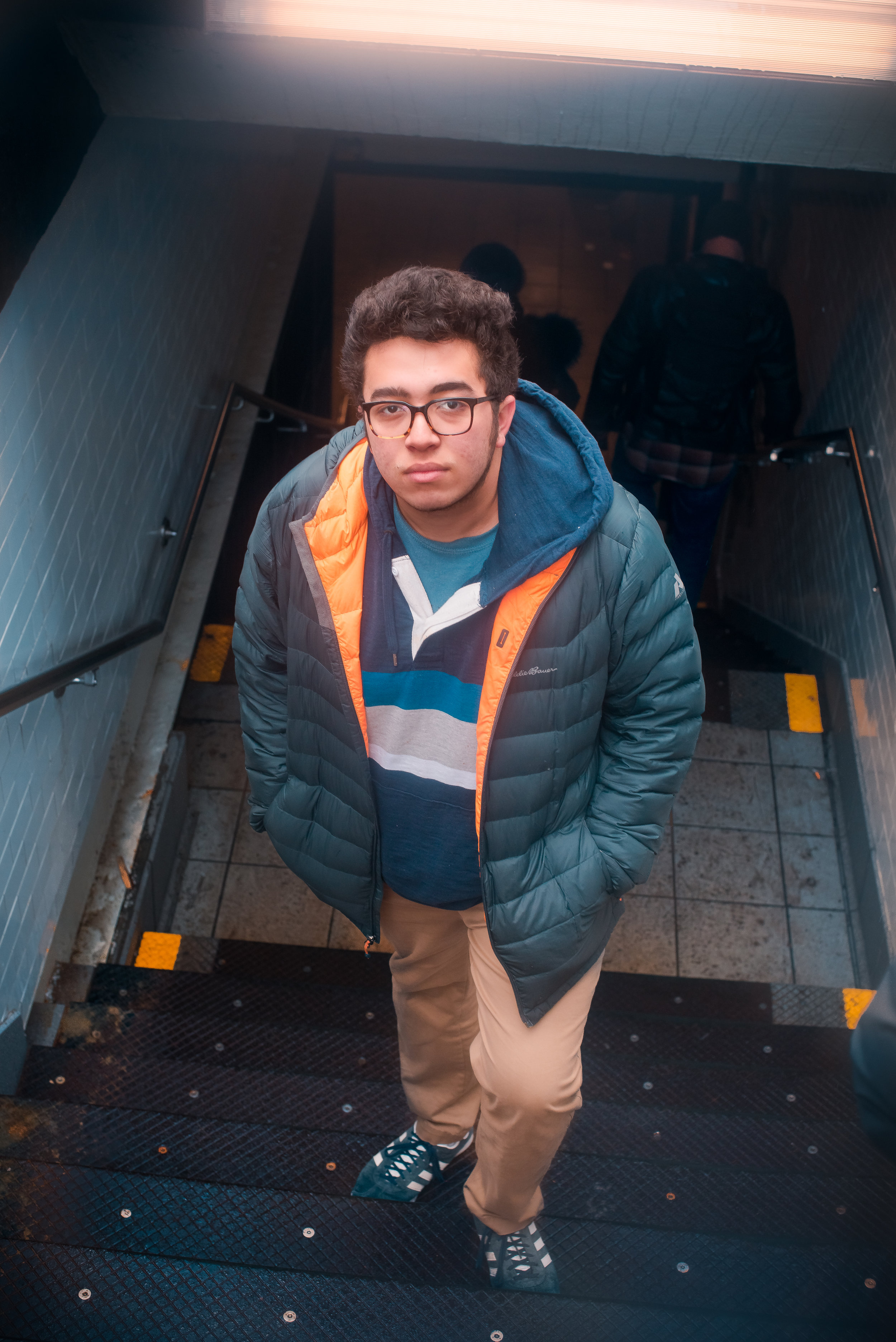
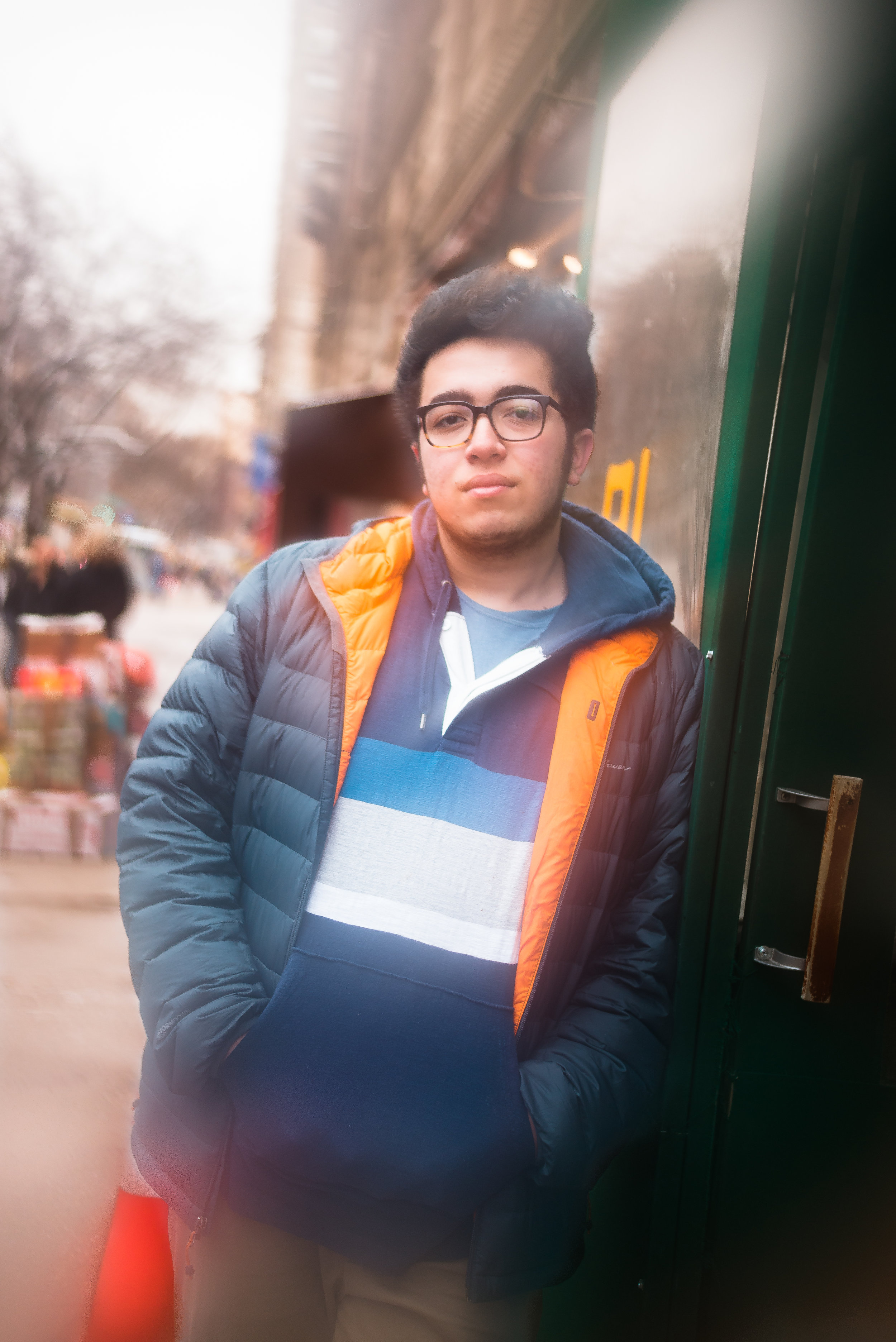
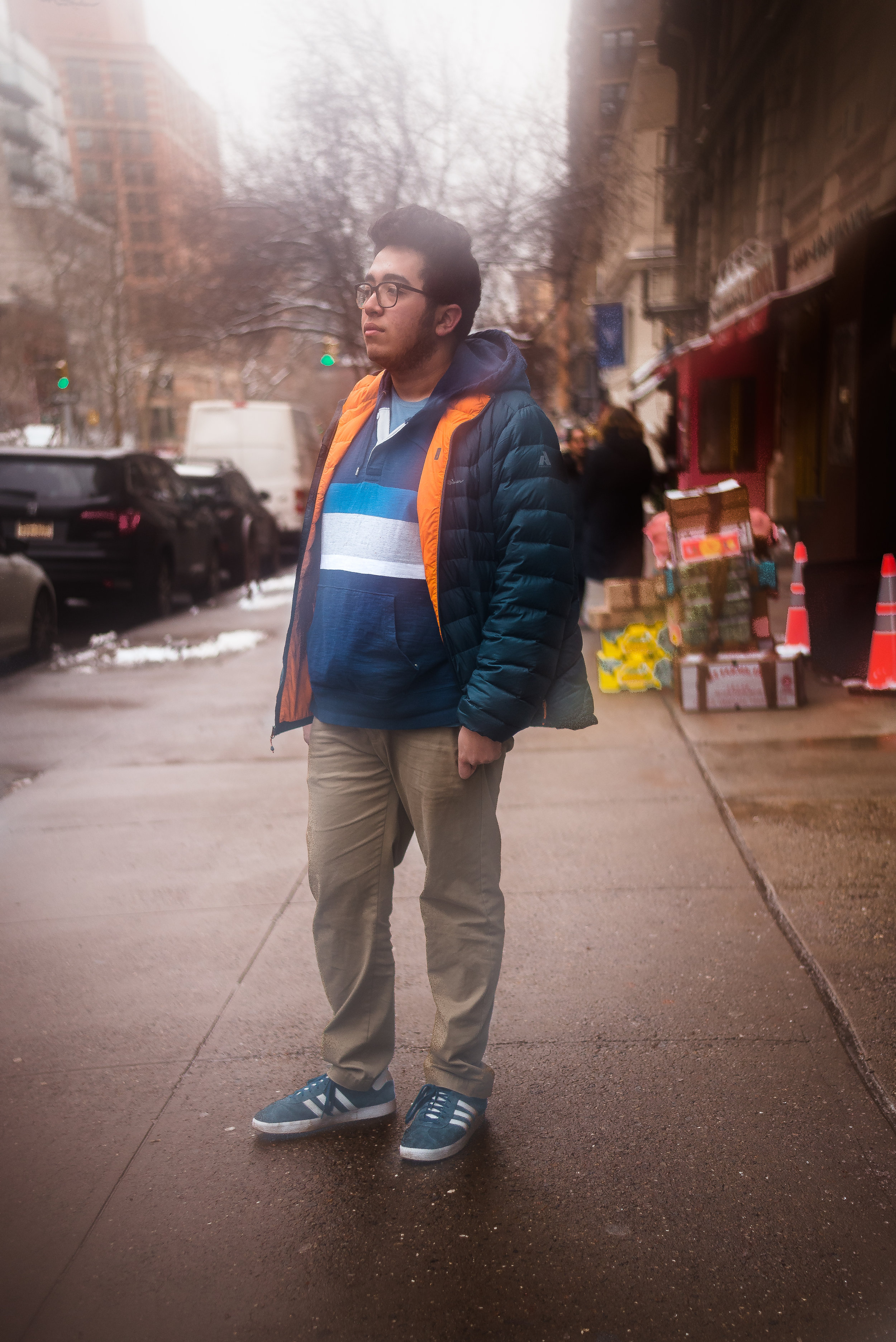
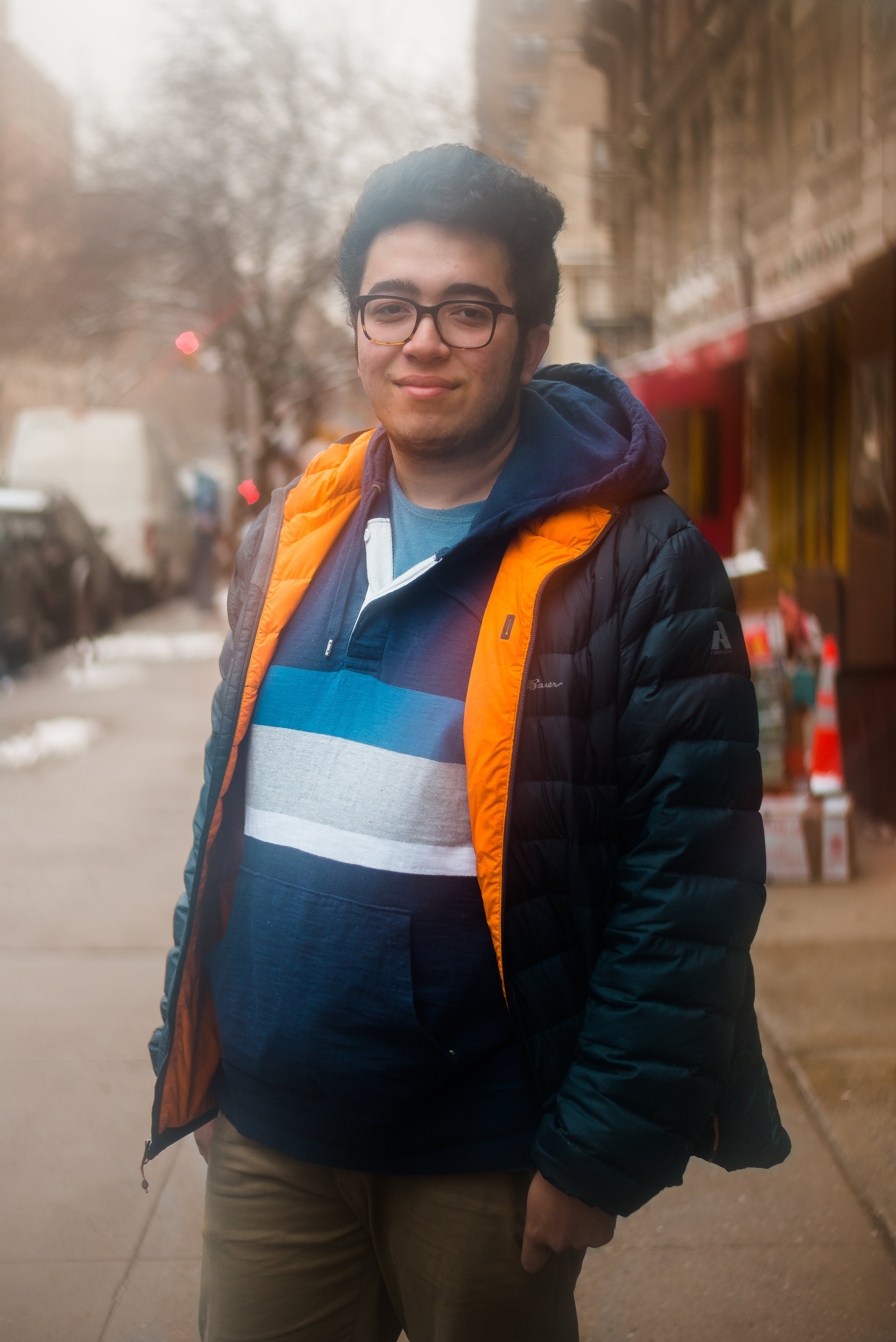
Photographs by Sabine Jean-Baptiste
Interview by Noa Levy-Baron
Nathan Farrell is a sophomore at CC, singer-songwriter and saxophone player. He is thinking about majoring in Public Health and Economics. Nathan primarily defines himself as a jazz musician, but other genres constantly inform and influence his work in his bands Farrose and Glass Room and as solo artist.
Favorite artist currently.
Right now I would say my favorite artist is probably H.E.R. She is fantastic! I really appreciate the music that she makes because usually, in a lot of mainstream pop, artists are reduced to a crafted image they are projecting on themselves. With H.E.R, it just feels very genuine. I also really like the fact that she writes most of her music is also a musician: she sings and she plays guitar, bass and piano. The writing is also very soulful, very raw. I've been really enjoying her these last two months. I’m listening to her albums on repeat.
Favorite song currently.
A song that I've been listening to a lot and that I really like is actually Yo No Se Mañana by Luis Enrique. It’s latin pop and has a little salsa to it. I like to think a lot about versatility within music. For example, right now my favorite artist is very different from my favorite song. I think it is really important to keep an open mind with music taste because that also makes you more versatile with the music you are creating.
How did music first enter your life? How has your relationship to it evolved since then?
I think my first real experience with music was because I really enjoyed Spongebob as kid and as I watched Squidward playing the clarinet I always thought I could do better than this! So I picked up clarinet and then I moved to flute and saxophone. As I started to move through woodwinds instruments I also figured out that I could kind of sing too. So I trained in different instruments and that gave me a basis in a lot of the music theory and the basic knowledge in music to then be able to create with. From there I let my own personal tastes and preferences dictate where I wanted to take the music that I make specifically.
I am a jazz musician. I play saxophone, and I try to incorporate that into my music a lot. But I would not say my primary musical pursuits are specifically within jazz. I like the liberties I can take in how I am creating in not restraining myself to one genre. Being able to craft your own thing completely is something [that] is very important, and to do that, it can be beneficial to set aside conventions that bind you to specific genres.
Do you collaborate often with other musicians or do you often work alone? Can you tell me about your band Farrose?
Lately I've been focusing a lot on the collaborative aspect because, I mean, it's fun! Farrose is a band that I had in High School. We still play together sometimes, but it's only when we get back on breaks as the members are all in different parts of the country right now. It was a project we started because a friend wanted to dabble in production; eventually we began getting together to jam and write songs every week.
That experience was really important for me to grow as an individual artist. I then brought what I learnt to other musical groups that I am a part of. I have another band right now with college friends and some of my High School friends who go to Julliard, which is in the city as well. We get together once a week, and we try to perform, write songs and do gigs. Right now, our name is Glass Room. It's really hard to find a name for a band because it has to fit so perfectly, but I’m quite comfortable with this one.
Is there a difference between your solo work and work with Farrose and Glass Room? Is there any crossover?
Definitely! And I think it’s because when you are just coming together and making music with other people, you have everyone's voices coming into play even if they are not writing it. If I am bringing a song that I wrote by myself completely, fully charted, and I give it to all of the musicians; it is going to sound completely different depending on the band or even the musician I’m giving it to. This is not the case in every way, but there will be nuances and I really like that. I think with a band, you'll definitely hear more voices coming through. I try to keep that in mind while I write for specific cases: I would probably not write the same things for Midnight Blue than for Farrose or for just myself.
I have always been fascinated by the way musicians combine lyrics and melodies and create something very pleasant and enjoyable to listen to. How would you describe your creative process? Which part do you start with? Are you first composing the melody, creating the lyrics or focusing on the instrumental part?
I am also super fascinated by that, and I'm still obviously trying to figure everything out and get better in all those things. I think what has been more successful for me though is to build everything “down-up.” It's quite intuitive, but it is not always clear what part of it is the down and what part is the up. For me at least, the “up” tends to be the lyrics, because this is what you see on the surface at first - especially for someone who is not necessarily as well versed in musical intricacies or in the theory working behind all the chords. So usually, lyrics will be the last thing I do.
I like to start with chord progressions and see what it is evoking in me. Then I'll play with the melody and when I find something catchy, I record that melody and I listen to it again and think about what could the song be about. Then, I'll come up with a lyric to match it. It usually functions that way, and it is what I find I consistently do most, but it is not set and stone. I've done it the opposite way, I've also done mixes. Sometimes I want to write specifically about something, I'll have one lyric in mind, I'll put it on the table and think about a chord progression.
When, where and how do you prefer to listen to music?
I definitely prefer to listen to music while I'm chilling, especially in my bed. For me, listening to music is almost like reading a book. I'm not necessarily doing an analysis; but I'm usually trying to figure out how all of the pieces are coming together, where the artists are coming from and what they are trying to convey. I break apart the melody, the lyrics, the chorus and that is really interesting and fun to do. This is hard if you are not sitting, chilling out in a space where you are comfortable and just listening.
Would you describe yourself as a performer? What do you feel like when you perform?
I would definitely describe myself as a performer because that is most often the medium in which I will be relaying my art. I think music composition and performance are two distinct art forms. A lot of performing is learning to be you in the most authentic way. It is about putting it all out there and that is something that I do a lot in general. So for me, performing is something that I have a little bit of an inclination for, but it's also something that I am still developing when I perform on or off campus.
I found that I'm best at performing when I don't really view it as being on a stage, on an elevated platform. I perform better when I am literally not on a stage because it's almost as if I was talking to others in a different way. I think it is very hard to perform on huge stages, like stadiums, in a way that a lot of very big stars will do because you cannot connect to your audience as well.
It is interesting what you describe about authenticity because when we think about people on stage, we often think of them as playing a role, as being something else other than themselves…
That's also a part of it because sometimes your performance does not have to necessarily correspond to how you feel in the moment. If I am feeling sad one day, I don't necessarily want to be performing something sad and make everyone sad. A performance can be performative. If I'm sad and performing at a party, I have to draw on other feelings. But, even if it's performative, I think there is always something genuine about it because to successfully do it, you have to draw on a genuine part of you. There is a little bit of a tension there, but I think it is still ultimately authentic.
Are there music genres you are particularly attached to ?
I'm definitely very attached to Jazz and R&B, and I think this is mostly out of personal preferences. But, ultimately it's all the same. You're putting a combination of sound and silence together, and you're saying something on top of it. I know this view is not popular, but I wish more people did see it that way because it would make for a lot more collaboration, a lot more open-mindedness and community in the music community itself.
I think I view it that way because of my experience in many different pools: I'm a trained Jazz musician, I also like to do R&B, I used to play classical, and I have a lot of friends that are really into Indie/Rock - so I have a little experience in everything. I realized that ultimately all music genres are the same thing. It's the same foundation of chords; you're putting a melody over it, and sometimes you're putting words over it. Sometimes I'll find in Jazz the baseline of chord progressions that might have a bit more harmonic and melodic complexity, but you could bring that anywhere. There are a lot of different pop songs that have a lot of different chords moving, especially musicians like Stevie Wonder. This is also why a lot of Jazz musicians will say they like Stevie Wonder even if they don't like pop, but Stevie Wonder is a pop musician, he is funk, R&B, soul but also pop ultimately.
Do you have any people, musicians or artists who particularly inspire you?
I don't like to idolize specific artists. To me, the most important things that musicians can pick up come from more than just listening to recorded music- interacting with peers, and people who aren’t so much like you at all, is a defining aspect of the musical experience too. For inspiration I look more at people that I've met and interacted with musically, notably because I’ve had a lot of musical mentors. A big influence for me was my saxophone teacher because he really taught me to put forward the voice and the sound that was true to me. And this is something that I've not just carried with me in music but in my everyday interactions. So the most influential sources of inspiration are truly people that I know and meet.
Is there another medium of art you work in?
I wouldn't say that I am actively working on it; but - as I'm half Puerto Rican - salsa and latin music has been a huge part of my life. Unfortunately, I can't really dance that well, but I took Afro-Cuban dance here for my PE requirement. So I got to hone a lot of those skills and make my family proud. In that [class] I learned that dance is also sort of structured similarly, with foundation and aspects of a solo or group voice. The foundation is still the chord and the rhythm, but rather than a melody it's the technique that you employ or where you're gonna move. And then rather than the lyrics, it's how you're gonna move. So I just find it's just essentially the same: you're putting different combinations of different things on top of each other in order to express something that is true to you. So that's a fun thing that I've learned also through getting a little bit of dancing experience in there. And that also informed the way I think of other arts too. I don't think it is different for painting for instance.
What words would you use to describe yourself and your work?
I would only give one word, which is really important to me: open-mindedness. It's everything that I am approaching everything with. You can't dismiss something because you don't have experience with it or because you have bad experiences with it; it’s always going to be more complex than that. This is how I approach the music that I make, the music that I listen to, and how I perform.
How does your art relate to your identity? How has your life influenced your work?
I am from New Jersey and growing up with New York City as something that was there for me to use as a resource to see music, learn about music, and become a better musician definitely had an impact. I think it is impossible to separate your work from who you are, even if you try really hard because ultimately, it's your voice. It's still hard for me to fully answer that question though because I still feel I'm in that big-artist-development ramp that I have to get over to really establish myself.
On another note, has making music changed anything in your life? If so what?
Music has definitely made me reflect on a lot of things because it provided me with a different perspective. In the same way that you talk to your friend about your issues: when you hear it coming out of your mouth and when you hear them trying to conceptualize what is going on, you sometimes will think about it differently than you do in you. I think it is really important. In the same that going to therapy is really important Having another way to see what you are feeling and experiencing is very important for your own development because when you are just in your head, it is a lot. So if I'm just writing a song about it or drawing a certain experience or emotion in a song, I think that can definitely provide another perspective to what is going on. It can give you a broader lens to what you are actually feeling and experiencing.
Do you view yourself as a musician? Has making music changed the way you relate to or see yourself?
It's also a hard question. I mean, of course I am thinking of myself as a musician, but then I am thinking about how do you define a musician?! I personally think anyone can be a musician at any point. There are definitely varying levels of skill within being a musician, but perfectly mastering the technique is not absolutely essential. A lot of people will feel pretentious about being a musician because it becomes a huge part of their lives. They want to to take ownership over this because they feel it belongs to them. But it also belongs to everyone else!
Being a musician has been a huge thing socially, I've met some of my closest friends through music. I find that over time friendships shift and change,. But even if externally the friendships I have within music change, I always feel a connection to the musicians I worked with. It is a kind of vulnerability and connection that doesn't just go away. In making music together, you're really seeing another aspect of others and their stories. I almost think of it as a different social currency. My friendships might change with other musicians externally, but I'll ultimately feel close to them just because of the music we made together. The music is still there. It still exists, we could reproduce it if we wanted to. Music [has] definitely informed the way I socially interact all the time.
Has being at Columbia changed anything in the way you create and feature your work?
Columbia has definitely changed it. College in general is a very introspective experience where you are meeting people from a lot of different experiences and backgrounds, and you are learning the things that you value and why you value them. I also think Columbia is very good with the Core [Curriculum]. I know this is going to sound so “Columbia cliché,” but I do think that it brings light to your inner tensions. My toolbox of how I want to express myself and the ways that I understand the world have gotten better, I feel that my art has also gone up.
Specifically, not that where I grew up wasn't a diverse place; but as someone who is mixed-race, it was not something that was really prevalent where I am from. There were a lot of white and black people; but as I am asian and latino, they were not many of those communities where I was from growing up. I saw diversity but not necessarily me and that was something that was hard. Coming to Columbia definitely allowed me to better consolidate my identity and that also informed the way that I make music because it is about bringing your story [and putting it] out there.
Are you working on anything currently? Do you have plans for future projects?
Yes! Here we go. I'm really trying to get a solo release under my own name out there. I've got to a point where I definitely consolidated my identity and the message and story I want to tell. I got more comfortable in my own skin, navigating the world. I'd like to have a place where I can have a "progress report." I am currently trying to get by the end of the semester, a concrete release of a song that is mine. Hopefully before may.
Are there any lyrics from one of your song particularly meaningful to you that you would like to share as a conclusion?
Actually, I wrote a line last night: "All I need is to see that view, and I'm on my feet, I hope tonight brings something new." I feel it embodies the experience of putting things into perspective: “all I need is to see the view,”' to broaden my perspective. And that is what I do with music; all I need is to see the bigger picture. I think we all need to take a step back when we get into trouble in order to decide what to do next. I’m glad I wrote that because I think it encompasses that experience well, and it’s also about Manhattan, where you can always find opportunities to broaden your point of view.
Anything else?
Be ready because more is always coming!
